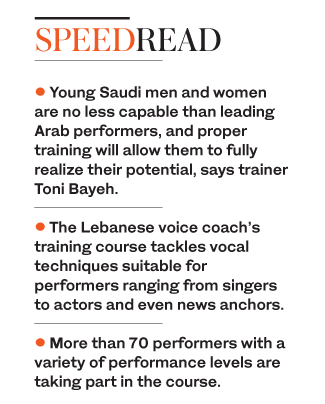JEDDAH: Wide-ranging reforms in Saudi Arabia are paving the way for a new generation of Saudi artistic talents, according to a renowned vocal trainer who has worked with some of the Arab world’s top stars.
“Saudi talents are coming to the surface in all areas of the arts,” Toni Bayeh told Arab News.
Bayeh, who is holding a vocal workshop at Jeddah Global Village, said that young Saudi men and women are no less capable than leading Arab performers, and proper training will allow them to fully realize their potential.
“I would like to extend my congratulations to the Kingdom for the changes being made on all levels, particularly in the arts,” he said.
The Lebanese voice coach’s training course tackles vocal techniques suitable for performers ranging from singers to actors and even news anchors.
The four-day workshop focuses largely on breathing as a basis for improving performance skills.
“We shed light on phonetics and highlight better performance techniques. We help participants to use their articulatory system to produce the right vocal sound at the right time,” Bayeh said.
More than 70 performers with a variety of performance levels are taking part in the course.
“This is quite normal and we find it everywhere — some are talented, others are less proficient, while some others just need some help to improve,” he said.
Bayeh, who has worked with famous Arab singers such as Assala Nasri, Nancy Ajram and Carole Samaha, said the voice of Mohammed Abdu will remain one of his favorites.
“I love to hear Abdu’s voice. We have also Wadih El-Safi and Nasri Shamsuddin. They are wonderful performers,” he said.
The vocal coach said that modern technologies that allowed studios to correct out-of-tune vocal performance had their place, but “no matter how efficient these devices or computer programs are, we can distinguish between a man’s pure sound and a refined one.”
A young Saudi participant in the course, Anas Al-Mokhtar, told Arab News that he was thrilled to be taking part in the Jeddah workshop.
“Learning is a never-ending process and we will always be learners. In this course, we have learned so many things,” the law graduate said.
Al-Mokhtar described Bayeh as “one of the most skilful Arab vocal trainers.” “We need more of these courses. We need courses by famous players of all musical instruments. We have musicians whose talents need to be improved by expert musicians,” he said.
However, Saudi singer Haitham Al-Shawli believes that it is too early to introduce music in the Saudi school curricula since many people still believe that singing is impermissible in Islam.
“We need more training courses like the one we have today. Music education is more important than holding music concerts,” said Al-Shawli, who owns a music-training center. “Our music talents need to learn at home instead of traveling abroad.”
“We had a problem getting visas to bring trainers from outside the country, but we hope we can help promote musical culture,” he added.
Al-Shawli said that it is difficult to introduce music in schools, like PE and art.
“Many people are not ideologically ready to accept that music is permitted in Islam. I suggest there should be low-cost private centers and institutes to provide such courses. As a start, the education ministry can financially support students who would like to join such centers.”
Top Arab vocal coach gives future Saudi stars a voice
Top Arab vocal coach gives future Saudi stars a voice

- More than 70 performers with a variety of performance levels are taking part in the course













